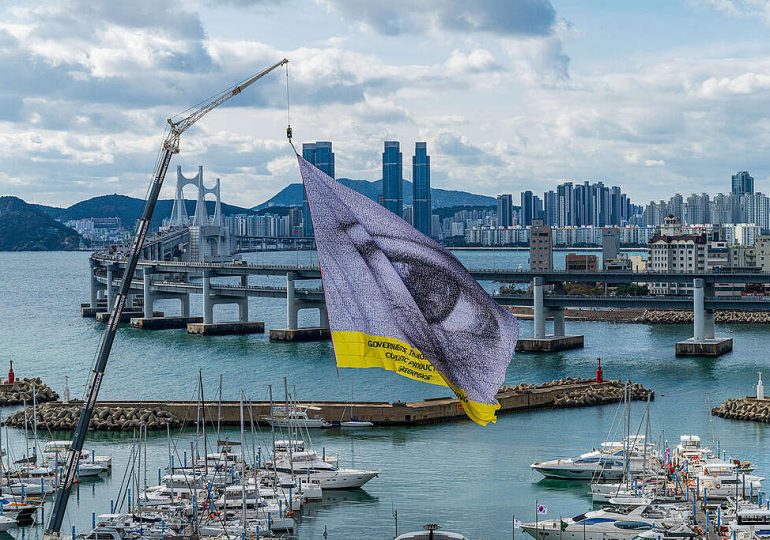Last week in Busan, South Korea, an extraordinary moment unfolded—a moment powered by your passion, your determination, and your voices. Together with WWF and Break Free From Plastic, Greenpeace delivered a petition signed by almost three million people from 182 countries, demanding a historic, legally binding Global Plastics Treaty. This collective call for action is nothing short of inspiring. You’ve made it loud and clear: the world is ready to move beyond plastic pollution and toward a sustainable, healthier future.
A Global Movement, United for Change
This petition isn’t just a collection of signatures; it’s a symbol of hope, resilience, and an unwavering demand for justice. It represents millions of people—individuals like you—who care deeply about protecting the planet, our health, and the generations to come.
The delivery of this petition was more than a ceremonial act. It was a rallying cry to decision-makers at the Intergovernmental Negotiating Committee (INC-5) meeting in Busan—the most pivotal negotiation yet in the fight to establish a Global Plastics Treaty.
#WeAreWatching is a monumental flag with a giant eye composed of thousands of portraits from around the world, unfurled from a 10-storey crane as government representatives are gathering for the the fifth and final Intergovernmental Negotiating Committee (INC5) meeting for a Global Plastics Treaty. © Greenpeace / Sungwoo Lee
A Powerful Handover in Busan
The petition was presented to Juliet Kabera, Director General of the Rwanda Environment Management Authority, and US Senator Jeff Merkley, symbolizing a bridge between diverse global voices and the decision-makers who can bring about real change.
Renowned poet Nikita Gill, along with South Korean youth activists and Baby Climate Plaintiffs Hannah Kim and Jeah Han, led the event. Their presence underscored the urgency of this issue and the need for intergenerational action.
Nikita Gill reminded us:
“I am here in Busan today, representing the voices of millions worldwide who are asking our world leaders to put our beautiful planet before profits during this week’s Plastics Treaty negotiations. I hope these voices are being heard and can inspire key decision-makers because this is our only chance to secure a treaty that will drastically reduce plastic production and use for the sake of our collective future.”
Hannah Kim envisioned a better world:
“Imagine a future where the ocean is free of plastic islands, our communities thrive, and we can breathe clean air. I strongly hope that our generation’s demands to respond to the climate and plastic crisis will be heard.”
Jeah Han called for decisive action:
“If our planet is in danger, so is my future. While children’s voices can draw attention, it is the adults with decision-making authority who can truly drive change. We are calling for action and demanding that governments all around the world address the climate and plastic crisis.”
Greenpeace, together with WWF and the Break Free from Plastic coalition delivers a global petition featuring 2.9 million signatures calling for an end to the age of plastic at the INC-5 Plastics Treaty negotiations in Busan, South Korea. © Greenpeace / Sungwoo Lee
Why a Global Plastics Treaty Matters
A strong, legally binding Global Plastics Treaty has the potential to transform the way we produce, use, and manage plastics worldwide. Here’s what it could achieve:
1. Drastically Reduce Plastic Production
By addressing plastics at the source, the treaty can limit unnecessary production and shift toward sustainable alternatives.
2. Eliminate Harmful Chemicals
Many plastics contain toxic chemicals that harm human health and ecosystems. A treaty can enforce stricter regulations to eliminate these dangers.
3. Protect Our Oceans and Wildlife
Plastics pollute waterways, threaten marine life, and disrupt ecosystems. Global action can prevent further damage and restore natural habitats.
4. Combat Climate Change
Plastic production is a significant contributor to greenhouse gas emissions. Reducing reliance on plastics can help curb climate impacts.
5. Safeguard Human Health
Plastics leach toxic substances into the environment and our food systems. A treaty can protect communities from these harmful effects.
6. Support a Circular Economy
By promoting reuse, repair, and recycling, the treaty can help build a sustainable economy that prioritizes resource efficiency.
7. Unite Global Efforts
A treaty ensures a cohesive, coordinated response to plastic pollution, replacing fragmented and voluntary actions with enforceable global standards.
8. Empower Vulnerable Communities
Communities on the frontlines of the plastic crisis—often in the Global South—will benefit from reduced exposure to plastic waste and pollution.
9. Hold Corporations Accountable
The treaty can enforce producer responsibility, ensuring corporations bear the cost of managing plastic waste and developing sustainable alternatives.
10. Inspire Innovation
By prioritizing sustainability, the treaty will drive innovation in materials science, waste management, and sustainable production.
End of Plastic Protest in La Union with a bold message to world leaders to “END PLASTIC NOW.”
© Noel Celis / Greenpeace
Voices of Leadership
The significance of this treaty was reinforced by global leaders at the INC-5 negotiations:
Graham Forbes, Greenpeace Head of Delegation, said:
“These signatures are more than a million reasons why the world cannot continue on this path of unchecked plastic production. The negotiation that will happen here in Busan this week is an unmissable chance to move away from harmful throwaway culture and create a future where our health, climate, and planet thrive.”
Eirik Lindebjerg, WWF Head of Delegation, added:
“These signatures reinforce what is already commonly known—that a legally binding global treaty that regulates plastics across the entire lifecycle and eliminates harmful plastic products and chemicals is the only way our leaders can deliver on their promise to end plastic pollution.”
Von Hernandez, Break Free From Plastic Global Coordinator, called for urgent action:
“Millions worldwide demand a strong Plastics Treaty to reverse the global plastic pollution crisis now harming our health, our climate, and the planet’s life support systems. World leaders gathering here in Busan must deliver an agreement that progressively cuts the unfettered production of plastic and eliminates the toxic chemicals associated with their manufacture and use. Anything less than this would be a regrettable missed opportunity.”
Thank You for Leading the Way
To everyone who signed, shared, and stood up: thank you. Your commitment has brought us to this critical moment. While the road ahead will require even more determination, the movement to end plastic pollution is stronger than ever—and it’s thanks to you.
Together, we’re holding big polluters accountable. Together, we’re making history. Together, we’ll ensure that the Global Plastics Treaty becomes a reality.
As negotiations continue, we promise to keep fighting for the strong, binding treaty that you, and the planet, deserve. Let’s keep up the momentum—our future depends on it.
Sign the petition for a strong Global Plastics Treaty
Governments around the world are now negotiating a Global Plastics Treaty – an agreement that could solve the planetary crisis brought by runaway plastic production. Let’s end the age of plastic – sign the petition for a strong Global Plastics Treaty now.




